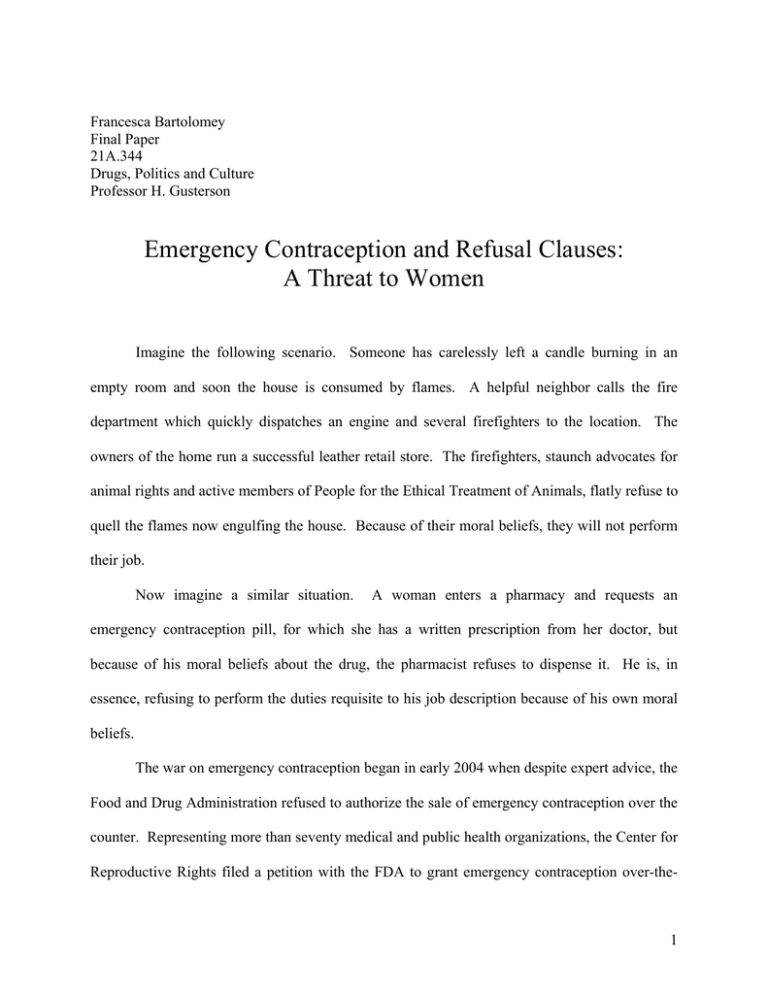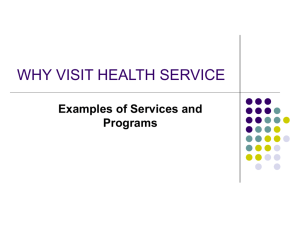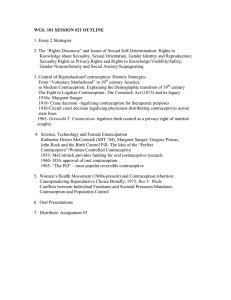Emergency Contraception and Refusal Clauses: A Threat to Women
advertisement

Francesca Bartolomey Final Paper 21A.344 Drugs, Politics and Culture Professor H. Gusterson Emergency Contraception and Refusal Clauses: A Threat to Women Imagine the following scenario. Someone has carelessly left a candle burning in an empty room and soon the house is consumed by flames. A helpful neighbor calls the fire department which quickly dispatches an engine and several firefighters to the location. The owners of the home run a successful leather retail store. The firefighters, staunch advocates for animal rights and active members of People for the Ethical Treatment of Animals, flatly refuse to quell the flames now engulfing the house. Because of their moral beliefs, they will not perform their job. Now imagine a similar situation. A woman enters a pharmacy and requests an emergency contraception pill, for which she has a written prescription from her doctor, but because of his moral beliefs about the drug, the pharmacist refuses to dispense it. He is, in essence, refusing to perform the duties requisite to his job description because of his own moral beliefs. The war on emergency contraception began in early 2004 when despite expert advice, the Food and Drug Administration refused to authorize the sale of emergency contraception over the counter. Representing more than seventy medical and public health organizations, the Center for Reproductive Rights filed a petition with the FDA to grant emergency contraception over-the- 1 counter status. Two advisory panels of the FDA found that the drug met all the criteria necessary for the granting of such status and recommended that this change be made. Typically, after having reached such a verdict, the FDA would accept the advice of the scientific advisors and approve a drug for over-the-counter status, but with emergency contraception it did not. Officials for the FDA issued a statement citing fears of potential teenage promiscuity as the reason that over-the-counter status was denied for emergency contraception. Forty-one members of Congress asked the FDA to rescind its decision.1 With no sociological evidence to back up this claim, the FDA rejected over-the-counter status for emergency contraception, and faced a wave of criticism for it, based on political reasons. Once considered a fluke in the pharmaceutical business, pharmacists’ refusal to fill prescriptions for emergency contraception is now seen as an immediate threat to women’s reproductive health. Ever since the controversy in which Wal-Mart categorically refused to supply the emergency contraception drug Preven, one by one pharmacists around the country have exercised what they considered to be their right of refusal on religious or moral grounds to supply emergency contraception. A pharmacist in Denton, Texas refused to fill the prescription of a rape survivor for emergency contraception in February 2004. He cited “religious convictions” as the reason for his refusal.2 The problem is ever-increasing. A study conducted 1 Kaufman, Marc. (2004, May 13). "2 FDA Officials Urged to Resign Over Plan B." The Washington Post, p. A3. 2 Austin, Liz. (2004, Feb. 21). “Emergency Contraception Denial Raises Moral, Legal Issues.” The Associated Press. 2 on America’s nearly 600 Catholic hospital emergency rooms revealed that only 28 percent offered emergency contraception to rape victims.3 Available for more than twenty-five years, emergency contraception is a method of preventing pregnancy after sexual intercourse has occurred. Emergency contraception comes in pill form or, less often, in the form of an intrauterine device, or IUD. In the latter case, a small copper device is implanted into the uterus after intercourse which secretes copper stimulating the Fallopian tubes to act as spermicides.4 The IUD is then removed after the next period when it is certain a pregnancy has not occurred, or it can be left inside the body as an effective contraceptive for up to twelve years. The most common form of emergency contraception comes in pill form. It is generally two pills, taken twelve hours apart, which contain much higher doses of the hormones that are contained in regular oral contraceptive pills. Some emergency contraception pills, like Plan B, can be taken up to 120 hours after intercourse has taken place. These pills prevent pregnancy by inhibiting ovulation or fertilization. They cannot stop a pregnancy if it has already occurred; it is not an abortifacient. 5 There is some scientific debate about whether or not emergency contraception in IUD form can prevent a fertilized embryo from implanting by thinning the endometrial lining of the uterus, but there is no sufficient scientific evidence to back up that 3 CFFC – Catholics for a Free Choice. (2002). Second Chance Denied: Emergency Contraception in Catholic Hospital Emergency Rooms. Cambridge, MA: Ibis Reproductive Health. 4 Hatcher, Robert A., et al. (2005) A Pocket Guide to Managing Contraception, 2005-2007 Edition. Tiger, Georgia: Bridging the Gap Foundation. 5 Grimes, David. (1997) “Emergency Contraception: Expanding Opportunities for Primary Prevention.” New England Journal of Medicine. 337(15), 1078-9. 3 claim.6 Even if that were true, the current medical and legal definition of pregnancy is when the embryo is implanted into the uterus, not when the sperm meets the ovum. There is persistent confusion surrounding emergency contraception and RU-486, even in the medical world. They are two very different drugs, and it is worth pointing out their distinct differences. Emergency contraception cannot do anything about an embryo. Once fertilization takes place, the pills are useless. They cannot prevent implantation nor can they dislodge an already implanted embryo in any way. They are also not harmful to the embryo should the woman decide to proceed with the pregnancy. To obtain emergency contraception, a woman needs a written prescription from her doctor which she must present to a pharmacist. RU-486, on the other hand, is an abortifacient. If taken within 56 days of the last period, RU-486 can successfully abort a fertilized embryo. When a patient who discovers her pregnancy early enough chooses medication abortion, the first step is a methotrexate injection administered by her doctor or a mifepristone pill. The next step is a misoprostol pill that the patient takes at home. The first pill causes the breakdown of the uterine lining ending the pregnancy. The second pill causes contraction of the uterus and expulsion of the contents. The last step in the process is to return to the doctor’s office for an ultrasound to make sure the uterus is completely emptied of any embryonic remains.7 When a patient needs RU-486, she must go to a doctor. Side effects common after the administration of RU-486 are similar to those of a spontaneous miscarriage such as abdominal pain, bleeding, dizziness, fatigue, changes in body temperature or 6 Alvarez, Frank, et al. (1988). “New Insights on the Mode of Action of Intrauterine Contraceptive Devices in Women.” Fertility and Sterility, 49(5). 768-73. 7 “Medication Abortion – Questions and Answers.” Planned Parenthood Federation of America. <http://www.ppfa.org/pp2/portal/files/portal/medicalinfo/abortion/pub-medical-abortion.xml> 4 gastrointestinal distress. 8 Risks for patients who chose medication abortion are minimal compared to those who wait and choose surgical abortion because there is no longer the risk of uterine perforation. Also, the procedure does not require anesthesia.9 In fifteen years, only seven deaths from RU-486 have been reported.10 The patient will not see a pharmacist during the entire transaction. Activist groups that oppose abortion generally oppose emergency contraception as well on the false notion that it can cause an abortion. Not only does emergency contraception provide the obvious benefit of post-coital pregnancy prevention, but it is also perfectly safe for women of all age to use. A whopping 91 percent of 235 women who participated in a study about emergency contraception reported that they were satisfied with the results. 11 The following statistics were obtained from the Alan Guttmacher Institute12: • • • • • About 7 of every 10 women of reproductive age are sexually active and do not want to become pregnant. 95% of American women use contraception at some point during their reproductive years. 50% of contracepting women use methods which require a prescription. About half of America’s 6 million pregnancies are accidental – of those, about half are terminated by abortion. 74-95% of teen pregnancies are unintended. 8 ACOG — American College of Obstetricians and Gynecologists. (2001, April). "Medical Management of Abortion."ACOG Practice Bulletin, 26, 1-13. 9 Aguillaume, Claude J. & Louise B. Tyrer. (1995). "Current Status and Future Projections on Use of RU-486."Contemporary OB/GYN®, 40(6), 23-40. 10 Creinin, Mitchell D. & Elizabeth AubÉny. (1999). "Medical Abortion in Early Pregnancy." In Maureen Paul, et al., Eds.,A Clinician's Guide to Medical and Surgical Abortion. p. 91-106. New York: Churchill Livingstone. 11 Harvey, S. Marie, et al. (1999). “Women’s Experience and Satisfaction with Emergency Contraception.” Family Planning Perspectives, 31(5), 237-40 & 260. 12 Alan Guttmacher Institute. <http://www.guttmacher.com> 5 • Emergency contraception could prevent about 1.5 million unintended pregnancies and 800,000 abortions each year in America. The benefits that could be reaped by widespread availability and usage of emergency contraception are inestimable. It is safe to assume that those who would prevent its use do not believe in abortion. Therefore it is in everyone’s best interest not to impede the dispensation of this revolutionary drug. To reiterate, emergency contraception pills could prevent about 800,000 abortions every year in America. Both pro-life groups and advocates of women’s reproductive rights would like to see a substantial reduction in the regrettable practice. Unfortunately, it seems that only groups like the Planned Parenthood Federation of America take any realistic and productive steps toward reducing the needs for abortion by providing contraceptives, abortions and most importantly, honest information. Currently, four states (Arkansas, Georgia, Mississippi and South Dakota) have explicit legislation that allows pharmacists to refuse to dispense contraception, both emergency and otherwise, at their own discretion. Five other states (Colorado, Florida, Illinois, Maine and Tennessee) have broadly-worded legislation that implies pharmacists and pharmacies may refuse to fill prescriptions for emergency contraception.13 These laws are unjust. Someone might liken the idea of a pharmacist refusing to supply emergency contraception on moral grounds to the right of a Catholic obstetrician-gynecologist to refuse to perform an abortion. I do not think this is a valid analogy. Emergency contraception does not constitute an abortion and anyone who says otherwise refuses to acknowledge the facts. By supplying this drug the pharmacist is in effect preventing the need for an abortion. A Catholic doctor should not be required to perform 13 Alan Guttmacher Institute. “Emergency Contraception.” State Policies in Brief. 1 May 2006. < http://www.guttmacher.org/statecenter/spibs/spib_EC.pdf> 6 an abortion because to do so would be to require him or her to actively take a life. This is not the case with emergency contraception. A more fitting analogy would be a cardiologist refusing to treat a patient suffering from a heart attack because the patient is wearing leather and the doctor believes leather is murder. The relationship between a patient and her doctor is an extremely personal one. The role of the pharmacist is to carry out the doctor’s orders, not to pass judgment. If everyone were allowed to pick and choose what parts of their job they would do on a daily basis because of some convoluted idea of morality, there would be a breakdown of basic social services overnight. Pharmacists are paid to do a job and their job consists of filling doctor-ordered prescriptions. No one is asking them to murder anyone, just to dispense drugs. As long as women have a legal right to emergency contraception, it is not the decision of the pharmacist to deny them access to it. Denying patients of their legal right to access to healthcare is discrimination and it cannot be tolerated. In every other paid job, employees are expected to leave their personal issues at the door when they come in for work. If there is an aspect of your job you despise so much that you will compromise another individual’s healthcare over it, you should quit or be fired. At an Eckerd pharmacy in Texas, three different pharmacists refused to fill a customer’s prescription for emergency contraception. She was able to fill it later at a Walgreens and those three Eckerd pharmacists were later fired. 14 A pharmacist in a Wisconsin K-Mart refused to dispense 14 Austin, Liz. (2004, February 21). "Friend Recounts Rape Victim's Search for Morning-After Pill." The Associated Press. 7 emergency contraception because he “did not want to commit a sin” and is now on trial for violation of the state’s Regulation and Licensing Department’s standards of care.15 What is perhaps more disturbing than a handful of pharmacists who refuse to dispense emergency contraception to women who need it is an increasing trend toward conservatism. The religious right would love to see an America of old when abortion did not happen, where conception was a natural and loving process occurring only within the confines of wedded bliss. This world they would hope to “return” to never actually existed. These people refuse to live in the world as it is. Abortions were happening long before Roe v. Wade. As long as women are able to become pregnant, abortions will happen. It is better to accept that fact and make the process as safe and as unnecessary as possible. Emergency contraception is a key figure in that battle. Unfortunately, some anti-abortion groups oppose all forms of contraception. Judie Brown, president of the American Life League, says, “The mind-set that invites a couple to use contraception is an anti-child mind-set…So when a baby is conceived accidentally, the couple already have this negative attitude toward the child. Therefore seeking an abortion is a natural outcome. We oppose all forms of contraception.” 16 This kind of ideology is particularly dangerous. While Ms. Brown is perfectly entitled to her own opinion, it is exactly that, her own. She, and others who share her views, have no right to force those views on others. Just as I do not have the right to tell others they must have an abortion or they cannot eat meat or they should 15 Weier, Anita. (2004, October 12). "Rx License Is On the Line In Abortion Fight: Pharmacist Refused Pill Order Due To Faith." The Capital Times, p. 1A. 16 Shorto, Russell. (2005). “Contra-Contraception.” The New York Times Magazine. May 7. 8 really never wear white after Labor Day, so should others respect women’s right to privacy and leave the medical decisions between her and her physician. The most important advantage of living in America today is the right to make personal decisions about your own body and your own life without anyone else’s intrusion. Pharmacists are not demi-gods and should have no say in what women do with their own bodies regarding their own reproductive health. If emergency contraception actually had the ability to cause an abortion, I might feel differently. If that were the case then I would suggest that doctor’s offices be required to stock the drug (provided the doctor felt comfortable handing out the drug). In truth, I believe that emergency contraception should be available to all women who want it over the counter. This would solve the problem of pharmacists who feel they are compromising their beliefs and yet women would still be able to make informed reproductive decisions in privacy. Some people might counter the suggestion that emergency contraception be available over the counter with the fact that some pharmacists would refuse to even stock the drug because of their beliefs. But it is not up to the pharmacist to decide what people will do with the things they buy once they go home. I always found it interesting that a person needs a renewed prescription for birth control every six months, but if someone swallowed an entire pack, all that would happen would be some serious cramping. If that same person walked into a pharmacy, purchased a pack of Tylenol and swallowed the whole pack at home, she would be dead. Safety is truly not what is concerning the FDA in its refusal to grant emergency contraception over-thecounter status. Emergency contraception truly is a controversial drug, but most of the controversy is clouded by misinformation. The strategy of many religious organizations to put an end to the practices 9 they find offensive is to suppress information and keep the public in ignorance. I doubt the practice of abortion will ever cease whether it is legal or not. The only way to make it an extremely rare procedure is to supply the public with comprehensive sexual education and to make birth control as available as possible. An informed public is integral for a responsible society. 10






